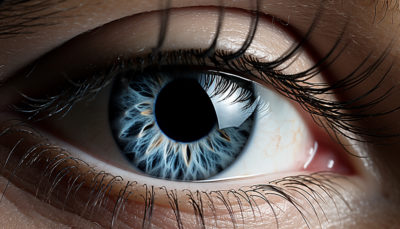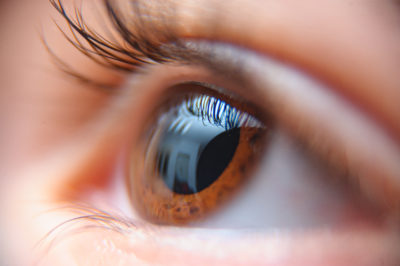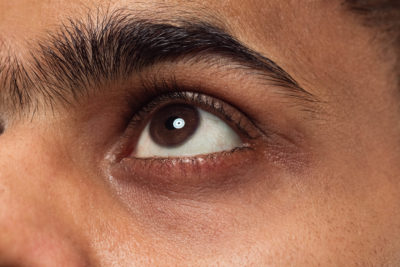Cornea is the front transparent part of the eye and allows light to enter the eye. Additionally it accounts for 2/3 of the focusing power of the eye. Any disease or swelling of cornea can cause corneal clouding and this can cause a drop in vision. A lot of patients with corneal swelling may also complain of pain and light sensitivity along with reduced vision. Corneal swelling can happen due to many reasons and in most cases it resolves by itself.
Many years ago, when I was still in school, my father got operated for cataract. He had a complicated cataract and needed an extensive cataract surgery. He was operated by an expert cataract surgeon. However in spite of the best efforts of the surgeon my father developed corneal edema or in other words swelling in the cornea. When next day his eye bandage was removed he could not see much from the operated eye. This made him and all of us extremely worried. This was because my father had lost vision in his other eye in childhood and could not see from the other eye also! So the operated eye was the only good eye. Surgeon re-assured us and informed us regarding post cataract corneal swelling and that it will slowly settle down. I observed my father go through the suffering and insecurity for 2 weeks till his corneal swelling completely resolved. Having seen the consequences of corneal swelling from close quarters makes me realize the impact of corneal swelling on patient’s vision and life.
Reasons due to which patients may develop corneal swelling and cloudiness after cataract surgery
-
Pre-existing weak corneal endothelium
– In some conditions like Fuchs’s endothelial dystrophy, Healed viral keratitis, healed corneal injuries etc. corneal endothelium may be already weak. Some other eye diseases like glaucoma, uveitis etc. can also weaken the corneal endothelium. These eyes with weak corneas are prone to corneal swelling when they undergo cataract surgery. In most cases it resolves by itself. Very rarely corneal swelling does not resolve and this tends to happen if the pre-existing corneal damage had been extensive.
-
Advanced Brown Cataracts
– Surgery on hard advanced cataracts can be damaging for the cornea and can lead to corneal swelling after the cataract surgery. During phacoemulsification cataract surgery a lot of energy is utilized for emulsification of hard nucleus and this in turn can cause clouding of cornea. Therefore it is advantageous for the patients to plan their cataract surgery at the right stage and not wait for the cataract to mature.
-
Difficult Cataract surgery
– Some cataract surgeries are more challenging and require a lot of manipulation inside the eye during the cataract surgery. This happens in some conditions like complicated cataracts, previous retinal surgeries, and post injury cataracts with associated zonular weakness etc. Longer duration and excessive manipulation can cause cornea to sustain some amount of damage during the cataract surgery. This in turn causes corneal swelling and clouding after the cataract surgery. In most cases it settles down and in rare cases it may be permanent and require cornea transplantation.
-
Toxic reaction
– In rare cases the solutions and medicines which are used during the cataract surgery may cause toxicity and induce a reaction inside the eye. This reaction also called Toxic Anterior Segment Syndrome causes corneal swelling. In most cases this reaction and the corneal swelling subsides with proper treatment after the cataract surgery.
Rajan had come to us with complaints of hazy vision in his right eye. He had undergone cataract surgery in his right eye 10 years ago. His symptoms started with increased light sensitivity and watering and soon he also developed reduced vision in his right eye. By the time he presented to us his cornea had developed a diffuse clouding and swelling. We found that the intraocular lens which was inserted in his eye by his surgeon had moved from its place and was rubbing against the back of the cornea. This slowly damaged the cornea and caused corneal swelling. We replaced that lens with another lens and slowly the corneal swelling subsided.
On one hand are patients like Rajan where once the offending cause was removed the corneal swelling subsided. On the other hand are patients like Sunita who develop an irreversible corneal swelling and undergo cornea transplantation. Sunita developed toxic reaction to some solution during the cataract surgery. She also had a pre-existing weak cornea which worsened the corneal edema. In spite of all the medical treatment her corneal swelling did not regress and she ultimately underwent cornea transplantation.
I think it is important to understand that corneal clouding and swelling after cataract surgery can happen. It is not always normal to have corneal swelling after cataract surgery. It is a rare occurrence. In majority of cases corneal swelling settles down within a few weeks with just medical treatment. Very rarely surgical treatment like cornea transplantation is required. The good news is that cornea transplantation has become very advanced and with newer surgeries like DSEK and DMEK, we can just replace the diseased corneal endothelium and cure corneal swelling.









